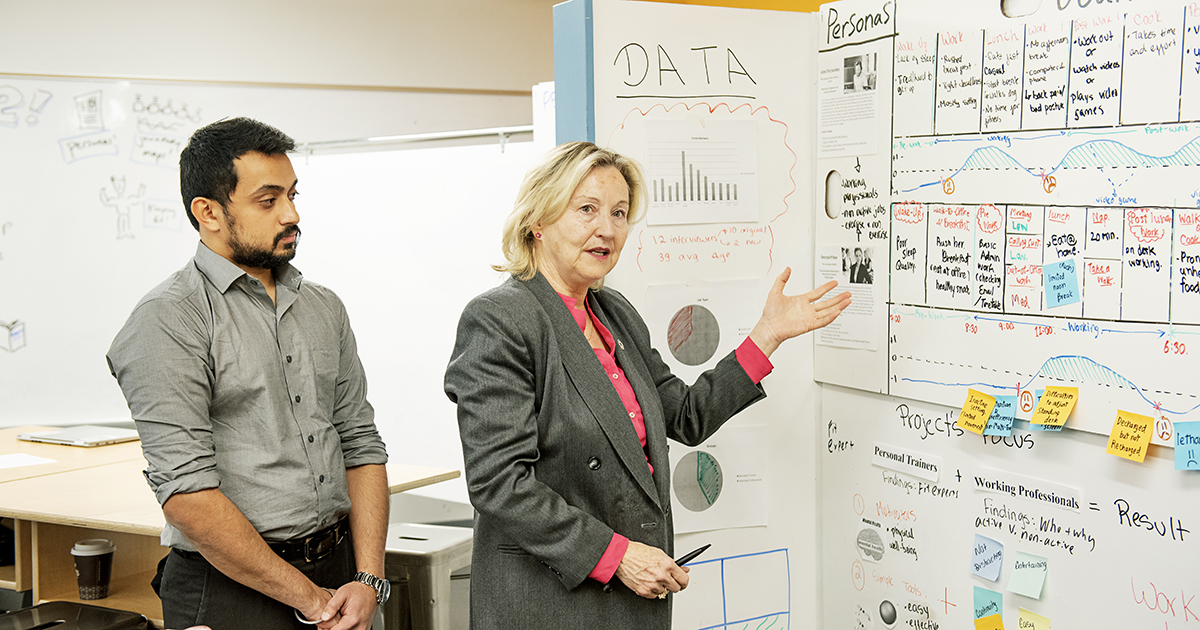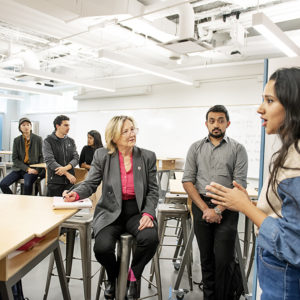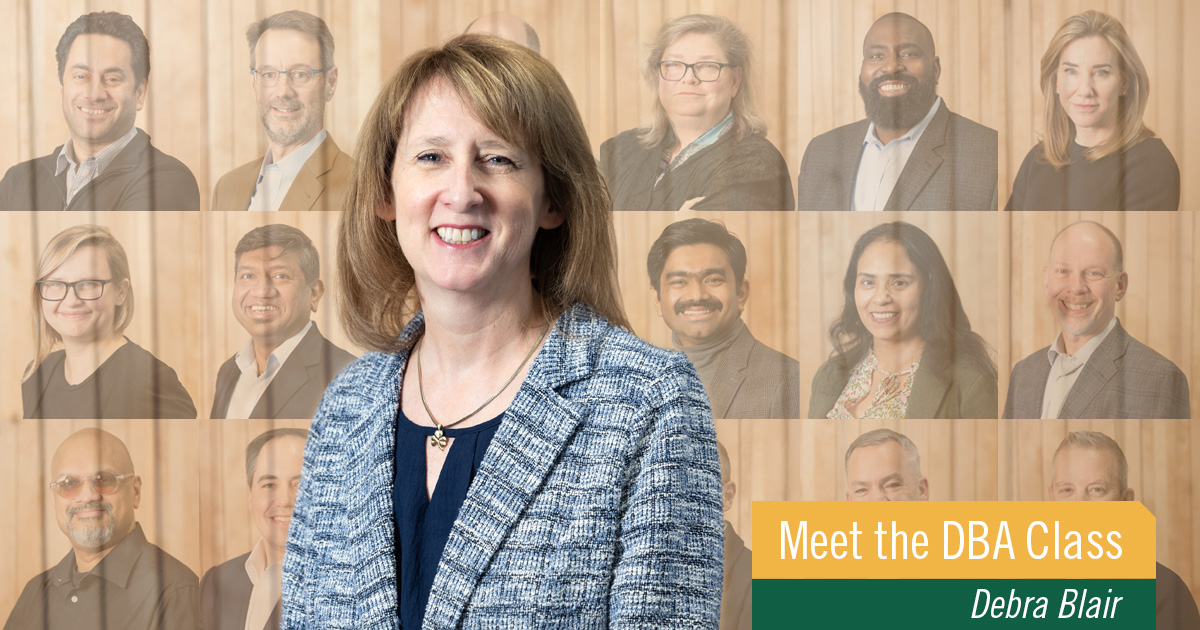Teaching, Practice Faculty Titles Better Define College Roles

A four-year effort to expand and update Babson College’s teaching and practice faculty job descriptions and career paths started with a routine visit from the Association to Advance Collegiate Schools of Business (AACSB) and one simple question in 2018.
The visit prompted a discussion about a new trend in higher education regarding the job titles for full-time, non-tenure track faculty. Several colleges and universities had recently replaced titles such as “lecturer” and “senior lecturer,” with “professor of practice” and “professor of teaching” to better highlight the faculty’s focus, skills, and experiences in the real world.
“How do you feel about your job titles?” the AACSB examiner asked the gathering of Babson lecturers and senior lecturers.
The reaction, said Babson Professor of Practice Caroline Daniels, was instantaneous.
“The reaction was vociferous,” said Daniels, who has more than 30 years of experience consulting for corporations such as Apple, IBM, Shell Oil, and The Economist.
Motivated by the discussion, Daniels began to research higher education designations and job descriptions across peer organizations.
“The former definitions were written about 100 years ago, and since then the teaching and practice faculty have been asked to not only teach but also develop curriculum, provide experiential exercises, and take part in the management of the school,” Daniels added. “The scope of tasks increased in both depth and breadth, but the definition of what the teaching and practice faculty contribute to the school had not changed.”
The titles overlooked the real-world experience that so many Babson faculty members bring to the classroom, the management decision making on committees that guide the school’s activities, and the important innovations that have significant strategic impact, such as the development of experiential activities that teaching and practice faculty create.
Those high-stakes boardroom connections and cutting-edge practices provide the College with a competitive advantage as parents and students seek an education that will not only provide students a degree but also a career, Daniels said.
“Practice faculty have experience and knowledge about the challenges leaders and organizations face and how decisions are made,” Daniels said. “We connect the real-world experience to the classroom in activities such as live case discussions with business leaders and experiential learning methods such as simulations to help students understand how to make decisions that make a difference.”
Research and Action
Daniels continued her extensive research on higher education titles and job descriptions, tracking down the faculty titles. She created an extensive chart comparing every classification of faculty job titles and descriptions. The dean of faculty, who is now the Vice President of Academic Affairs & Dean of the College Ken Matsuno, saw Daniels’ work and reached out to her after he was appointed to that position in June 2019.

Caroline Daniels, who has worked on global business strategies for companies such as Apple and Shell Oil, teaches a class at Babson College.
“As an institution focused on entrepreneurial leadership, we needed to reflect on how we cultivate the development of our faculty. Babson embraces a ‘portfolio of talent’ approach that includes scholarly academics, teaching academics, and practice academics,” Matsuno said. “The practice and teaching professors contribute their real-world experiences and excellence in teaching to underline the business and liberal arts thoughts, theories, and practice taught inside the classroom. This is just one of the many ways in which we support our faculty’s development and strengthen Babson’s competitive edge when hiring and retaining our faculty.”
Matsuno asked Daniels to present her findings to President Stephen Spinelli Jr. MBA’92, PhD and the Board of Trustees. By the time she made her high-stakes presentation, Daniels’ extensive experience as a consultant came into play.
“Teaching and practice faculty make up 25% of the faculty,” Daniels told the board. “How important is it for Babson College as a leading educational institution to integrate the strategic value of that amount of the workforce into our strategy?”
The board saw the value immediately, Daniels said.
They also green-lit her proposal. Daniels—along with Assistant Teaching Professor Jon Hodge, Associate Professor of Practice Richard Hanna, and Associate Professor David Nersessian—formed a working group and embarked on a campus-wide listening tour.
The Work Continues
The faculty title changes approved by the trustees last spring—which include assistant, associate, and full professor of practice for business divisions and assistant, associate, and full professor of teaching for the liberal arts division—weren’t just about updating job descriptions, Daniels said.
“It’s important to have a title that supports the activities that we do and, frankly, is regarded in the business and liberal arts world as highly valued,” Daniels said. “We have C-suite executives and entrepreneurs teaching here. We have incredibly experienced and skilled faculty members and we need to make sure that is known.”
The Entrepreneurship Division, for example, has Leslie Charm, an associate professor of practice at Babson who has decades of corporate leadership experience and is a sought-after turnaround consultant. And, Edward Marram, associate professor of practice, was an entrepreneur in the high-technology industry for more than 35 years. He founded and served as president and CEO of Geo-Centers, a professional service firm lauded as one of the fastest-growing companies in the United States.
“It’s important to have a title that supports the activities that we do and, frankly, is regarded in the business and liberal arts world as highly valued.”
Caroline Daniels, professor of practice
Daniels and a team of dedicated teaching and practice faculty is determined to build on the work started.
“We are in the process of identifying all of the various activities that members of the teaching and practice faculty carry out so that we can develop meaningful career paths that connect to the Babson College strategy and vision for our future,” Daniels said. The changes will support the leadership position Babson has as students continue to learn with valuable real-world, on-the-job experiences integrated into their studies.
“The leading schools of the future will commit to experiential learning and the combining of world-class teaching, practice, and research,” Daniels said. “As leaders in Entrepreneurial Thought & Action®(ET&A™), it is entirely fitting that Babson is creating pathways for faculty to lead in the delivery of world-class, innovative business education.”
Posted in Community




